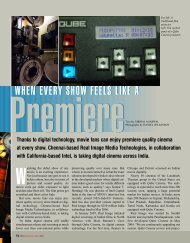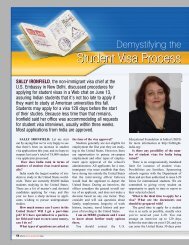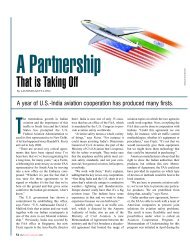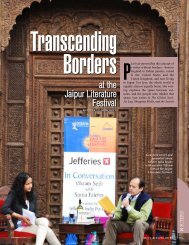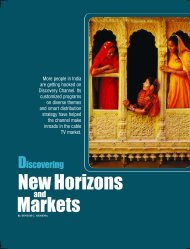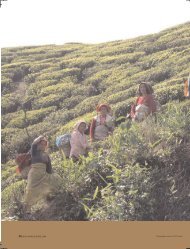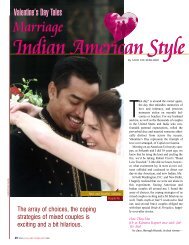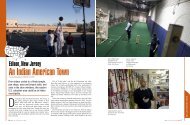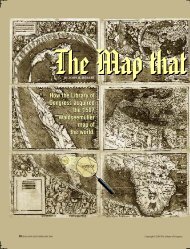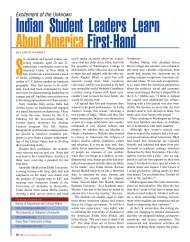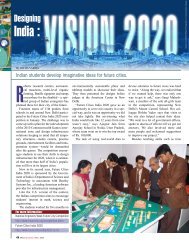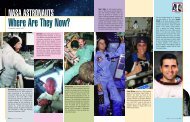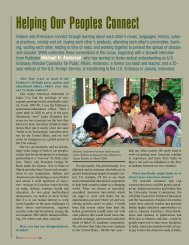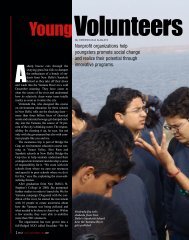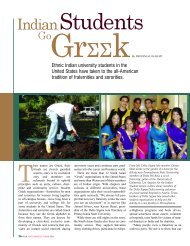You also want an ePaper? Increase the reach of your titles
YUMPU automatically turns print PDFs into web optimized ePapers that Google loves.
HEMANT BHATNAGAR<br />
market during the U.S.<br />
recession of 1981-82 and<br />
couldn’t find work for five<br />
months. He went to work for a<br />
publishing house, at a lower<br />
salary than he was expecting,<br />
but in a beautiful office<br />
overlooking New York City<br />
with a chance to develop his<br />
expertise in cultural relations<br />
and eventually travel to<br />
Europe as a sales representative.<br />
“It was a dream<br />
job in terms of corporate<br />
America,” he says. “This is<br />
how you start. That company<br />
experience later helped me<br />
pass the Foreign Service<br />
exam. As a mid-level manager<br />
you have to handle an in-box,<br />
delegate, hold a meeting and<br />
decide what to do.”<br />
Siddiqi has spent much of<br />
his 22-year diplomatic career<br />
in the Middle East. He speaks<br />
Arabic and met his wife in<br />
Tunisia. But he wanted his<br />
children to “discover their<br />
roots, see what the other half<br />
of the family looks like” and<br />
obtained the posting to India<br />
in August 2004.<br />
“I’m not from here, but I<br />
do have a historical affinity.<br />
My roots are from Delhi<br />
and Uttar Pradesh,” he<br />
says. “I feel connected to<br />
both countries, India and<br />
Pakistan. It was all one<br />
country. More doors are<br />
opened to me and people<br />
feel comfortable around<br />
me. But I went through 15<br />
years of isolation from this<br />
part of the world. It was a<br />
surprise to me, but in some<br />
ways I’m just as much<br />
learning the ropes and<br />
discovering new things as<br />
any other <strong>American</strong>.” <br />
PUSHPINDER<br />
DHILLON<br />
PUSHPINDER DHILLON, the Economic<br />
Affairs Officer who helped bring about the<br />
new India-U.S. open skies agreement,<br />
says the process of becoming an <strong>American</strong><br />
was a gradual journey, based on becoming<br />
comfortable with the society and value system.<br />
“What I really like about the U.S. is it’s as<br />
pure a meritocracy as you can find anywhere,”<br />
he says. “If you do your job well, whatever it is,<br />
it doesn’t matter where you are from, what your<br />
color or background is. In many societies, the<br />
identity of someone is as the son of or daughter<br />
of so-and-so. People ask, ‘Who is your father,<br />
what is your background?’ In the U.S., it’s,<br />
‘What do you do?’ ”<br />
Born in the Punjab village of Badal in 1957,<br />
Dhillon went to the University of Chicago to<br />
earn his master’s degree in finance. “I had full<br />
intentions of returning to India,” he says. “But<br />
it’s a process that creeps up on you. After four<br />
years in college I realized it was the place I<br />
wanted to live. I liked the system. It unbundles<br />
you from a lot of the constraints and limits that<br />
exist in India. I would come back here to India<br />
and would like it, but after a few weeks I would<br />
long for my life in the United States.”<br />
When it came time to become a U.S. citizen,<br />
he says, “It wasn’t that difficult. I felt it was my<br />
country. It was where I belonged.”<br />
By then, Dhillon had lived in some of the<br />
most beautiful parts of the United States, in<br />
Alaska and the Pacific Northwest. One of his<br />
first jobs was for the Alaska State Legislature.<br />
“The oil pipeline had come on line. Oil revenues<br />
were flooding in. They were looking for<br />
economists, professionals to help develop the<br />
state. I thought it would be a very good<br />
opportunity for a year. I stayed five years, the<br />
longest I stayed anywhere.”<br />
He then worked in Seattle, Washington, and<br />
Portland, Oregon, and married another Indianborn<br />
<strong>American</strong>. “I have always been open to<br />
alternate careers and I took the Foreign Service<br />
exam as a lark,” Dhillon says. When he first<br />
joined, his wife stayed behind as she had a good<br />
job in Portland.<br />
Dhillon was posted to Barbados, Berlin,<br />
Washington, D.C., Bangladesh, Washington,<br />
D.C., then India. He has two daughters, 13 and<br />
8, who are picking up Punjabi and seeing a lot of<br />
LAURINDA KEYS LONG<br />
“I would come back<br />
here to India and would<br />
like it, but after a few<br />
weeks I would long for<br />
my life in the United<br />
States.”<br />
In his office, Pushpinder Dhillon points out Badal.<br />
their grandparents. The children “threaten to<br />
disown me if I leave,” says Dhillon. The family<br />
loves to visit Badal, where Dhillon’s mother still<br />
lives.<br />
“I missed my parents when I first went to the<br />
U.S. Telephone rates were very high. Travel was<br />
very expensive. I missed a certain slow pace that<br />
is India, where the line between work and leisure<br />
is sort of blurred. I missed the afternoon siesta. I<br />
missed a whole generation of cricket!” he<br />
laments. “When I went to Barbados I watched<br />
some of the best cricket, and made up for it.”<br />
Dhillon’s job is “to show up, fly the flag, to<br />
advocate for <strong>American</strong> interests and to promote<br />
and deepen the economic ties between India and<br />
the United States. We encourage Indian<br />
economic reform, because Indian growth and<br />
prosperity are in the U.S. interest. We are on the<br />
cusp of a radically new partnership between the<br />
two countries. We have many differences, but I<br />
fully agree with observers who liken the two<br />
countries to natural allies, bound together by<br />
shared values, identical threats and common<br />
interests.”<br />
Dhillon says, “I like being a citizen of a<br />
country that has been a benign power for<br />
the most part, not unlike India. I disagree<br />
sometimes with policy, but when all is said and<br />
done, it mostly uses its power for good, for<br />
doing many things because they are the right<br />
things to do for mankind.” <br />
SPAN SEPTEMBER/OCTOBER 2005 43



